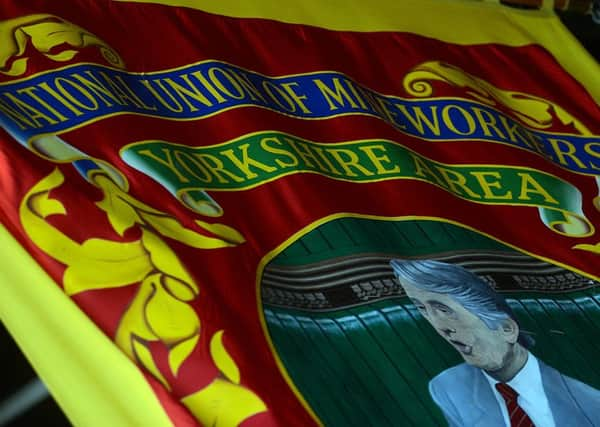How the miners' strike changed the trade union movement


The first such event, in 2015, was held to mark the 30th anniversary of the end of the miner’s strike – a dispute which changed the face of several tight-knit communities across the district forever.
After the civil unrest of the 1970s, Margaret Thatcher Government’s perseverance with pit closures in the face of widespread industrial action was seen by many as the death knell of trade union power in Britain.
Advertisement
Hide AdAdvertisement
Hide AdFor the hundreds in the Wakefield District facing long-term unemployment and for their families facing a grim struggle to put food on the table, the end of traditional coal mining was disastrous.
But while the events of three decades and their effects on this area will be at the forefront of many people’s minds at the With Banners Held High Event this year, the day is about looking forward as much as back.
March organiser Martyn Richardson is too young to remember the strike himself, having been born in 1983. But growing up in Barnsley he has vivid memories of the aftermath.
“It didn’t have a direct impact on me as such,” he explains. “Although my granddad was a miner, my dad was a lorry driver, so as a family we were OK.
Advertisement
Hide AdAdvertisement
Hide Ad“But as I grew up and went to school, I became more aware of what was happening. It caused a lot of deprivation.”
Defeat for the National Union of Mineworkers (NUM) and a raft of anti-picketing legislation, such as granting companies the right to obtain High Court injunctions against strikes was the beginning of successive Governments’ attempts to shackle workers groups.
More recently, the Trade Union Act 2016 now renders strike action unlawful unless the ballot gets a 50 per cent turnout. Described as the biggest crackdown since the miner’s strike, among the bill’s many criticisms is that many MPs are themselves elected without a 50 per cent turnout in their constituencies.
“Trade union laws have been eroded pretty relentlessly, especially over the last five or six years,” Martyn explained.
Advertisement
Hide AdAdvertisement
Hide Ad“It’s made it more difficult to do collective bargaining. It’s an ongoing battle and that’s why it’s important to keep going.”
Despite the difficulties, there remains a lingering sense of pride among mining communities about how they stoically opposed reform. Indeed many see the collective spirit that was shown as a success in itself.
Hemsworth MP John Trickett, who is speaking at With Banners Held High said: “The strike showed how much the values of community, mutualism and pride ran through our area.
“In those difficult times the whole community came together in solidarity and stood up for justice. I have always admired the strength which was shown.”
Advertisement
Hide AdAdvertisement
Hide AdMartyn added:”They did go a year without pay, but a lot of ex miners wouldn’t change it for the world. They stood up for their community proudly, and quite rightly so.”
The future of the trade union movement, as with everything else in the political world is uncertain. Many minds are hostile to the concept of unions: memories are tarnished by the violent actions of a small minority in spite of the peaceful nature of most demonstrations.
The collieries may be closed now, but campaigners for workers rights cite the UK’s small wage services culture as evidence that unions are needed as much now as ever.
Organisers are keen for next Sunday’s event to raise awareness among young workers about such issues and to encourage debate.
Advertisement
Hide AdAdvertisement
Hide AdMr Trickett says: “I still see that strength (from the miner’s strike) today in the communities I represent, many of which have been subject to zero hour contracts, short-term contracts and low pay.
“In fact, the same women servicing the soup kitchens in the strike are now stocking the food banks on which so many people are forced to rely.”
Live music, poetry and drama will also feature on the day, with the festival running from 10am until 5pm.
The banners are now on public display in Wakefield Cathedral until Saturday May 19.
Advertisement
Hide AdAdvertisement
Hide AdMartyn said:“The festival is very much about engaging with the heritage side of things but it’s also about the way forward as well.
“There’s lots of young people who don’t know what a trade union is and how it can help them. That’s why education is important, and spreading that word is what we’re hoping to achieve.”
David Spereall , Local Democracy Reporting Service